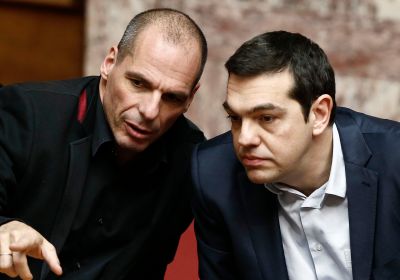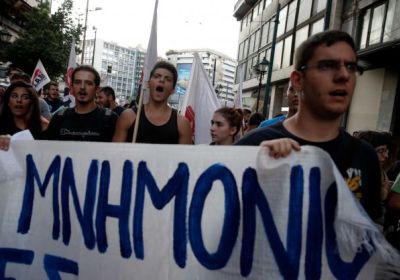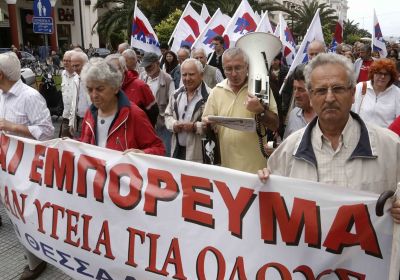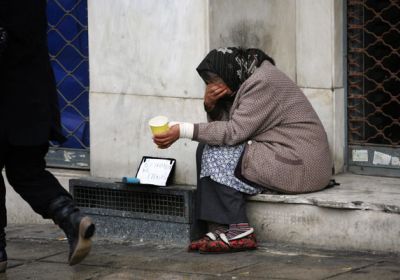
-
 An event of profound importance took place in Brussels on July 12. The significance of the European summit negotiations extends well beyond the immediate — and devastating — consequences for the people of Greece. The fallout will not just affect the stability of the Greek government and the political future of SYRIZA and Prime Minister Alexis Tsipras.
An event of profound importance took place in Brussels on July 12. The significance of the European summit negotiations extends well beyond the immediate — and devastating — consequences for the people of Greece. The fallout will not just affect the stability of the Greek government and the political future of SYRIZA and Prime Minister Alexis Tsipras. -

The Greek parliament passed a second bill on July 23 including measures needed for Greece to open negotiations over the eurozone's bailout package of 86 billion euros, TeleSUR English said that day.
-
 More than 60 lawmakers from Germany’s Die Linke (The Left) party voted against the proposal for further austerity for Greece on July 17. They accused the German government of “destroying Europe” by forcing Greece to accept hard-hitting austerity measures required by the eurozone for a third bailout deal.
More than 60 lawmakers from Germany’s Die Linke (The Left) party voted against the proposal for further austerity for Greece on July 17. They accused the German government of “destroying Europe” by forcing Greece to accept hard-hitting austerity measures required by the eurozone for a third bailout deal. -

Europe, as we know it, may well be over. The promise of a peaceful integration of equals with a capitalist framework lies tattered on the floor of a negotiation room in Brussels.
-
 New strikes have hit Greece as anger flares over the latest deal pushed onto Greece by the Troika of European Commission, European Central Bank and International Monetary Fund. Thousands of public sector workers from the ADEDY union took to the streets on July 15 as part of a general strike calling for the rejection of a raft of new austerity measures being put to the parliament by Prime Minister Alexis Tsipras.
New strikes have hit Greece as anger flares over the latest deal pushed onto Greece by the Troika of European Commission, European Central Bank and International Monetary Fund. Thousands of public sector workers from the ADEDY union took to the streets on July 15 as part of a general strike calling for the rejection of a raft of new austerity measures being put to the parliament by Prime Minister Alexis Tsipras. -

In the early hours of July 16, Greek parliament voted to accept the punitive July 12 funding deal put forward by eurozone lenders.
-
 The Greek Parliament voted in the early hours of July 16 to back the deal agreed to by Prime Minister Alexis Tsipras on the tough economic measures demanded by Greece's creditors. The vote came despite street protests and strikes -- and in the face of a statement released the day before by the governing SYRIZA party's central committee against the deal.
The Greek Parliament voted in the early hours of July 16 to back the deal agreed to by Prime Minister Alexis Tsipras on the tough economic measures demanded by Greece's creditors. The vote came despite street protests and strikes -- and in the face of a statement released the day before by the governing SYRIZA party's central committee against the deal. -
 Leading British campaigners against global debt have slammed the creditors over a deal reached between the European Union countries and Greece, likening the deal to the imperial politics of the 19th century. The debt campaigners also drew parallels with the way debt was used to control Latin American nations in the 1980s.
Leading British campaigners against global debt have slammed the creditors over a deal reached between the European Union countries and Greece, likening the deal to the imperial politics of the 19th century. The debt campaigners also drew parallels with the way debt was used to control Latin American nations in the 1980s. -
 “The conduct of a number of EU governments over the past number of weeks has been alarming,” president of Irish republican party Sinn Fein and member of the Irish Dail (parliament) Gerry Adams said on the outcome of the European Union summit, which ended Greece submitting to a harsh deal. “They have effectively closed down the Greek banking system and held the Greek Government and people to ransom.
“The conduct of a number of EU governments over the past number of weeks has been alarming,” president of Irish republican party Sinn Fein and member of the Irish Dail (parliament) Gerry Adams said on the outcome of the European Union summit, which ended Greece submitting to a harsh deal. “They have effectively closed down the Greek banking system and held the Greek Government and people to ransom. -

Greece's austerity-and-debt-driven crisis has prompted a humanitarian catastrophe. The Australia-Greece Solidarity Campaign says half of all young people cannot find work, there is a growing shortage of essential medicines and child malnutrition rates have reached levels not seen since World War II.
-
 Regardless of the result of the latest round of negotiations between the SYRIZA-led government of Greece and the heads of the 28 members of the European Union, one thing is certain: in coming years, the Greek people are going to need all possible solidarity because their struggles and sufferings are bound to continue. The best imaginable deal with the EU will mean six years of Troika-imposed austerity grinding along to one degree or another. Forced Greek exit from the eurozone will drive the country deeper into recession, further contracting an economy that has shrunk by 25% since 2008.
Regardless of the result of the latest round of negotiations between the SYRIZA-led government of Greece and the heads of the 28 members of the European Union, one thing is certain: in coming years, the Greek people are going to need all possible solidarity because their struggles and sufferings are bound to continue. The best imaginable deal with the EU will mean six years of Troika-imposed austerity grinding along to one degree or another. Forced Greek exit from the eurozone will drive the country deeper into recession, further contracting an economy that has shrunk by 25% since 2008. -
Members of the European Parliament show support for Greece against its creditors. "This debate is not exclusively about one country," said the Greece's left-wing Prime Minister Alexis Tsipras in a speech to the European Parliament on July 8. "It is about the future of our common construction."